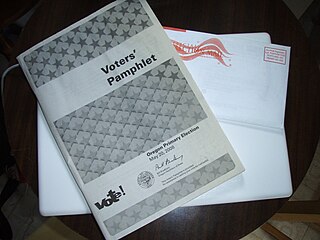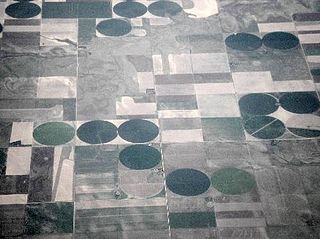
Proposition 54 was a California ballot proposition on the October 7, 2003 gubernatorial recall election ballot. It failed to pass with 3,144,145 (36.1%) votes in favor and 5,541,314 (63.9%) against. It was placed on the ballot through the initiative process.

In California, a ballot proposition can be a referendum or an initiative measure that is submitted to the electorate for a direct decision or direct vote. If passed, it can alter one or more of the articles of the Constitution of California, one or more of the 29 California Codes, or another law in the California Statutes by clarifying current or adding statute(s) or removing current statute(s).

Proposition 62 was a California ballot proposition on the November 2, 2004 ballot. It failed to pass with 5,119,155 (46.1%) votes in favor and 5,968,770 (53.9%) against.

The California state elections, 2006 took place on November 7, 2006. Necessary primary elections were held on June 6. Among the elections that took place were all the seats of the California's State Assembly, 20 seats of the State Senate, seven constitutional officers, and all the seats of the Board of Equalization. Votes on retention of two Supreme Court justices and various Courts of Appeal judges were also held. Five propositions were also up for approval.

California's state elections were held November 2, 2004. Necessary primary elections were held on March 2. Up for election were all the seats of the State Assembly, 20 seats of the State Senate, and sixteen ballot measures.

California's state elections were held November 5, 2002. Necessary primary elections were held on March 5. Up for election were all the seats of the California State Assembly, 20 seats of the California Senate, seven constitutional officers, all the seats of the California Board of Equalization, as well as votes on retention of two Supreme Court justices and various appeals court judges. Seven ballot measures were also up for approval. Municipal offices were also included in the election.

On November 4, 2008, the U.S. state of Oregon held statewide general elections for three statewide offices, both houses of the Oregon Legislative Assembly, and twelve state ballot measures. The primary elections were held on May 20, 2008. Both elections also included national races for President of the US, US Senator, and US House Representatives. Numerous local jurisdictions — cities, counties, and regional government entities — held elections for various local offices and ballot measures on these days as well.

California's state elections were held November 3, 1998. Necessary primary elections were held on March 3. Up for election were all the seats of the California State Assembly, 20 seats of the California Senate, seven constitutional officers, all the seats of the California Board of Equalization, as well as votes on retention of two Supreme Court justices and various appeals court judges. Twelve ballot measures were also up for approval. Municipal offices were also included in the election.

California's state elections were held November 8, 1994. Necessary primary elections were held on June 7. Up for election were all the seats of the California State Assembly, 20 seats of the California Senate, seven constitutional officers, all the seats of the California Board of Equalization, as well as votes on retention of two Supreme Court justices and various appeals court judges. Ten ballot measures were also up for approval. Municipal offices were also included in the election.

California's state elections were held November 3, 1992. Necessary primary elections were held on March 3. Up for election were all the seats of the State Assembly, 20 seats of the State Senate, and fifteen ballot measures.

California's state general elections were held November 5, 1996. Necessary primary elections were held on March 26, 1996. Up for election were all eighty (80) seats of the State Assembly, twenty (20) seats of the State Senate, and fifteen (15) statewide ballot measures.

Proposition 39 was an initiative state constitutional amendment and statute which appeared on the November 7, 2000, California general election ballot. Proposition 39 passed with 5,431,152 Yes votes, representing 53.4 percent of the total votes cast. Proposition 39 was essentially a milder version of Proposition 26, which would have ended the Proposition 13 supermajority vote requirement altogether, but was defeated with 3,521,327 "Yes" votes, representing 48.7 percent of the total votes cast, in the March 7, 2000, California primary election.

Proposition 1C was a defeated California ballot proposition that appeared on the May 19, 2009 special election ballot. The measure was a legislatively referred constitutional amendment that would have made significant changes to the operation of the State Lottery.

The California state elections, November 2010 were held on November 2, 2010.

The California state elections was held on Election Day, November 6, 2012. On the ballot were eleven propositions, various parties' nominees for the United States presidency, the Class I Senator to the United States Senate, all of California's seats to the House of Representatives, all of the seats of the State Assembly, and all odd-numbered seats of the State Senate.

The California state elections, June 2012 were held on June 5, 2012 and included two propositions, primary elections for each party's nominee for President, and primary elections to determine the top-two candidates for California's Class I seat to the United States Senate, all of California's seats to the House of Representatives, all of the seats of the State Assembly, and all odd-numbered seats of the State Senate, who will compete against each other in a run-off on November 6, 2012.

In California state elections, 2014 was the first year in which the top statewide offices were elected under the nonpartisan blanket primary, pursuant to Proposition 14, which passed with 53% voter approval in June 2010. Under this system, which first went into effect during the 2012 election year, all candidates will appear on the same ballot, regardless of party. In the primary, voters may vote for any candidate, regardless of their party affiliation. The top two finishers, regardless of party, then advance to face each other in the general election in November.

The California state elections, June 2016 were held on June 7, 2016 and included one propositions, primary elections for each party's nominee for President, and primary elections to determine the top-two candidates for California's Class III seat to the United States Senate, all of California's seats to the House of Representatives, all of the seats of the State Assembly, and all odd-numbered seats of the State Senate, who will compete against each other in a run-off on November 8, 2016.

California state elections in 2018 were held on Tuesday, November 6, 2018, with the primary elections being held on June 5, 2018. Voters elected one member to the United States Senate, 53 members to the United States House of Representatives, all eight state constitutional offices, all four members to the Board of Equalization, 20 members to the California State Senate, and all 80 members to the California State Assembly, among other elected offices.








